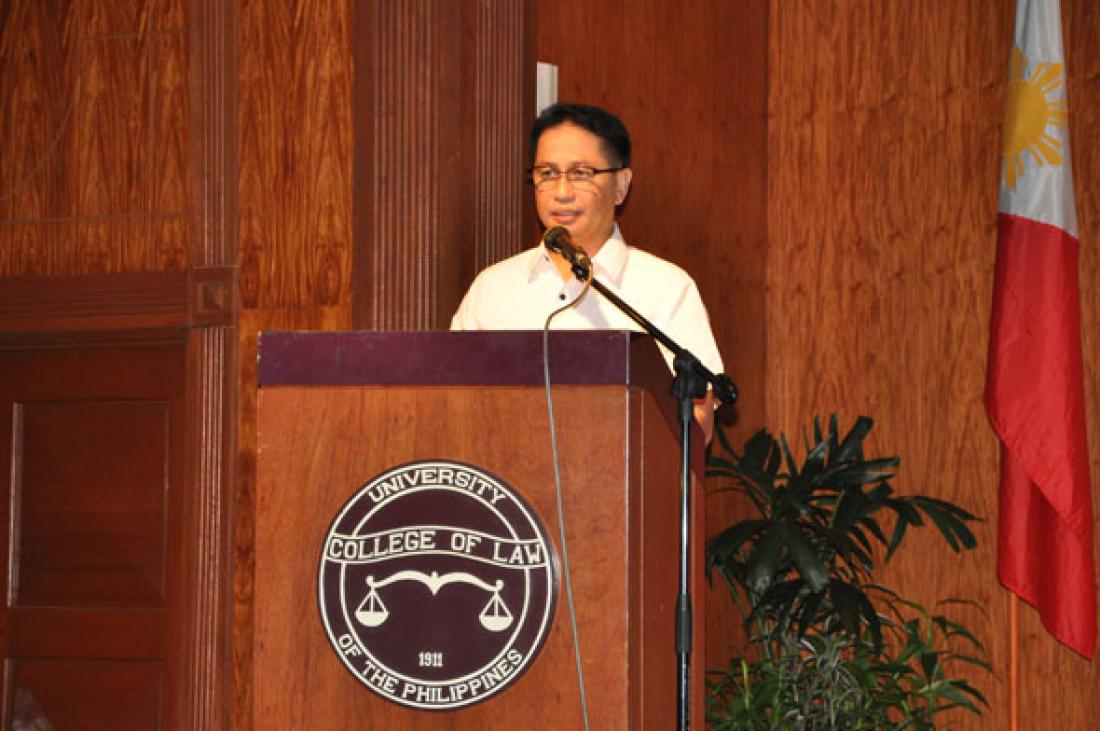A forum, described by UP College of Law’s (CL) Dean Danilo L. Concepcion as the “most significant political and legal controversy in years” was held on January 10 at the CL’s Malcolm Theater six days before the impeachment trial of Chief Justice (CJ) Renato Corona.
Entitled Impeachment: Law and Politics, the forum sought expert opinion on the controversial impeachment trial which Concepcion further describes as “a storm, [typhoon] Sendong’s political twin that threatens to tear down, sweep away the credibility of our country’s major political institutions.”
Impeachment is defined as “the process of removing from office high government officials charged with serious wrongdoing. As a process, impeachment is a formal inquiry aimed at making public officers accountable to the people based on the principle that public office is a public trust,” by the book Impeachment Q & A, edited by UP College of Law professors Carmelo V. Sison and Florin T. Hilbay.
On December 12, 2011, 188 or one-third of the total members of the House of Representatives filed an impeachment case against Corona for allegedly betraying public trust. The impeachment trial began on January 16.
Two opposing opinions regarding Corona’s impeachment were presented: one by the House of Representatives and the other by Integrated Bar of the Philippines (IBP). Among the speakers from Congress were Juan Edgardo M. Angara, Romero Federico S. Quimbo. IBP was represented by its president Atty. Roan I. Libarios.
According to Angara and Quimbo, Corona’s impeachment is not an isolated case and that it should serve its purpose: “to hold the high officials of the country accountable.”
One of the arguments presented in the impeachment complaint filed by the House of Representatives against Corona was “Instead of assuring and strengthening the independence and impartiality of the Judiciary, Respondent (CJ Corona) has instead demonstrated he is predisposed to favor and protect Mrs. Gloria Macapagal-Arroyo, who had appointed him to his position as Chief Justice in brazen disregard of the Constitution.”
Both Angara and Quimbo further asserted that the impeachment complaint was in accordance with the provisions of Section 2, Article XI of the 1987 Constitution “on the grounds of: a) Betrayal of Public Trust; b) Culpable Violation of the Constitution; and c) Graft and Corruption.”
Quimbo further stated that within the context of the articles of impeachment, “the reason why we undertake this particular impeachment [is because], we have seen that Chief Justice Corona, from the time or even before he was appointed as an Associate Justice, we see a very concrete pattern where the expectation in terms of independence and probity has gone and just totally out of the way.”
In response to Quimbo’s argument, Libarios said the impeachment complaint filed by the House of Representatives “is the sole prerogative of the House of Representatives…When we reviewed the process in [which] the impeachment [was filed], e napakalaki po nang naging problema sa proseso (there was a big problem in terms of the process).”
Libarios stated that the IBP was apprehensive about how the impeachment complaint was filed because “the case filed, with all due respect to the members of the House, it was referred to as a Verified Complaint. It was signed by 188 congressmen and congresswomen. However, we all know how it was processed. It was signed without reading and there was only one copy given to the caucus. It was treated as a done deal. It was as if they had just signed an attendance sheet. There was no discussion at all. There was no deliberation at all. There was even no actual reading of the allegations to the complainant. We computed that if each Congressman will be given five minutes to read only one copy of the complaint inside the caucus room, it will take four days before they finish reading it.”
He also argued that “considering the IBP’s core values is the rule of law, we cannot accept and we cannot support and we have to disagree with the process that failed to comply with the Constitutional requirements and the guarantee of due process of law.”
In addition, he said “Nahihirapan kaming tanggapin ‘yan (It is difficult for us to accept that) because if it can be done to the Chief Justice of the Land, what will prevent a majority block in Congress from using the same blue screen process…from cherry-picking on other Constitutional officers if the Constitutional Officer would disagree with the respective positions in Congress. That is the potential threat that we see that will serve a bad precedent.”
Furthermore, he said “Just because it so happens that the decision of the Supreme Court does not sit well with the leadership, in the House, in the Office of the President, there’s already a bind basis to seek for the impeachment, for removal. That is the bigger question here because that will send a chilling effect in judicial independence.”
In addition to the guest speakers, prominent members of the audience seen during the forum were Prof. Merlin M. Magallona, former CL dean; Antonio “Tony” Roman Jr., Presidential Legislative Liaison Office chief; Prof. Eduardo A. Labitag, UP Law Center Training and Convention Division head; and Atty. Salvador S. Panelo of the Union of the Masses for Democracy and Justice.
After the guest speakers presented their statements, a lecture on the impeachment’s law and politics was conducted by Hilbay. This was followed by an open forum moderated by Prof. Maria Rowena Amelia V. Guanzon, Officer-in-Charge of the Institute for the Administration of Justice, who also hosted the event.
Haidee C. Pineda



